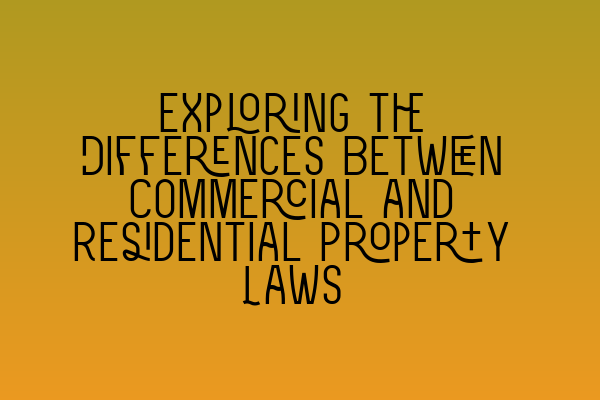Welcome to SQE Property Law & Land Law, where our team of expert solicitors specializes in providing legal services related to property law. In today’s blog post, we will take a deep dive into the world of property law and explore the key differences between commercial and residential property laws.
Before we delve into the details, let’s first understand what commercial and residential properties are. Commercial properties are typically used for business purposes, such as office buildings, retail spaces, or industrial units. On the other hand, residential properties are used as homes or dwellings for individuals and families.
Now let’s explore some of the key differences between commercial and residential property laws:
Purpose of Use:
One of the fundamental differences between commercial and residential properties is the purpose for which they are used. Commercial properties are primarily used for business activities, while residential properties are used for personal purposes, such as living, sleeping, and recreation.
Lease Agreements:
In the realm of commercial property laws, lease agreements are more complex and comprehensive compared to residential property laws. Commercial lease agreements often involve intricate clauses, such as rent reviews, break clauses, and repairing obligations, to protect the rights and interests of both the landlords and the tenants. On the other hand, residential lease agreements are relatively simpler, focusing mainly on rent, tenancy duration, and basic maintenance responsibilities.
Legal Protections:
When it comes to legal protections, residential property laws prioritize the rights and interests of tenants to ensure their safety and well-being. There are specific regulations in place to protect tenants from unfair eviction, rent increases, and substandard living conditions. In contrast, commercial property laws place more emphasis on contractual agreements between landlords and tenants, allowing them to negotiate terms and conditions that suit their respective business needs.
Planning Permission:
In the context of commercial properties, obtaining planning permission for changes in land use or property modifications is often a more intricate process compared to residential properties. This is because commercial developments might have a larger impact on the surrounding area, requiring stricter assessments of factors such as traffic, noise, and environmental impact.
Property Taxes:
Commercial and residential properties are subject to different tax regimes. Commercial properties are typically subject to business rates, which are based on the rateable value of the property. On the other hand, residential properties are subject to council tax, which is calculated based on the valuation band assigned to the property.
Financing and Mortgages:
Obtaining financing for commercial properties can be more challenging than residential properties. Lenders often require additional guarantees and a higher down payment for commercial properties due to the higher associated risks. Residential properties, on the other hand, have more accessible mortgage options available, often with lower interest rates and less stringent eligibility criteria.
While these are some of the key differences between commercial and residential property laws, it’s important to remember that property laws can vary from one jurisdiction to another. Additionally, there may be other specific nuances and considerations that apply, depending on the individual circumstances of the property transaction.
As solicitors specializing in property law, we at SQE Property Law & Land Law understand the intricacies of commercial and residential property laws. We provide comprehensive legal services to assist our clients in navigating the complexities of property transactions in a wide range of jurisdictions.
If you have any questions or require expert advice on commercial or residential property matters, please don’t hesitate to get in touch with us. We are here to assist you every step of the way.
Related Articles:
– SQE 1 Practice Exam Questions
– SQE 1 Practice Mocks FLK1 FLK2
– SQE 2 Preparation Courses
– SQE 1 Preparation Courses
– SRA SQE Exam Dates
We hope you found this blog post informative. Stay tuned for more valuable insights into the world of property law!
